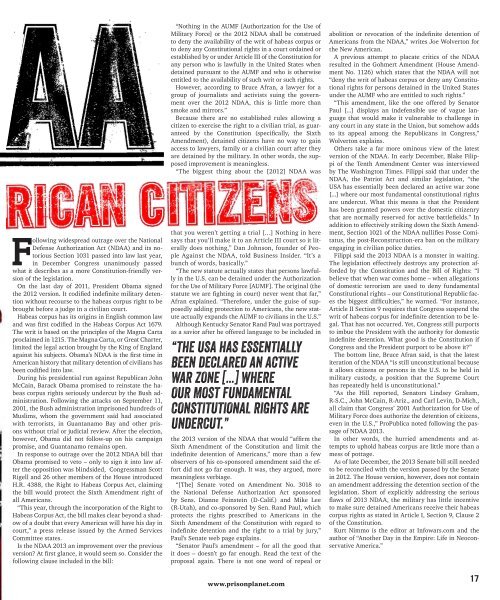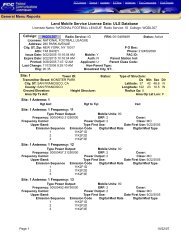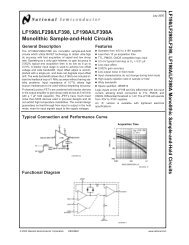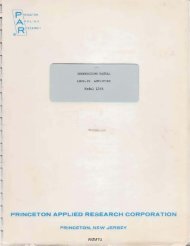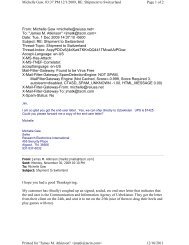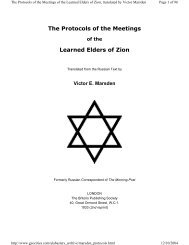Infowars_Magazine-Jan_2013.pdf
Infowars_Magazine-Jan_2013.pdf
Infowars_Magazine-Jan_2013.pdf
You also want an ePaper? Increase the reach of your titles
YUMPU automatically turns print PDFs into web optimized ePapers that Google loves.
Following widespread outrage over the National<br />
Defense Authorization Act (NDAA) and its notorious<br />
Section 1031 passed into law last year,<br />
in December Congress unanimously passed<br />
what it describes as a more Constitution-friendly version<br />
of the legislation.<br />
On the last day of 2011, President Obama signed<br />
the 2012 version. It codified indefinite military detention<br />
without recourse to the habeas corpus right to be<br />
brought before a judge in a civilian court.<br />
Habeas corpus has its origins in English common law<br />
and was first codified in the Habeas Corpus Act 1679.<br />
The writ is based on the principles of the Magna Carta<br />
proclaimed in 1215. The Magna Carta, or Great Charter,<br />
limited the legal action brought by the King of England<br />
against his subjects. Obama’s NDAA is the first time in<br />
American history that military detention of civilians has<br />
been codified into law.<br />
During his presidential run against Republican John<br />
McCain, Barack Obama promised to reinstate the habeas<br />
corpus rights seriously undercut by the Bush administration.<br />
Following the attacks on September 11,<br />
2001, the Bush administration imprisoned hundreds of<br />
Muslims, whom the government said had associated<br />
with terrorists, in Guantanamo Bay and other prisons<br />
without trial or judicial review. After the election,<br />
however, Obama did not follow-up on his campaign<br />
promise, and Guantanamo remains open.<br />
In response to outrage over the 2012 NDAA bill that<br />
Obama promised to veto – only to sign it into law after<br />
the opposition was blindsided, Congressman Scott<br />
Rigell and 26 other members of the House introduced<br />
H.R. 4388, the Right to Habeas Corpus Act, claiming<br />
the bill would protect the Sixth Amendment right of<br />
all Americans.<br />
“This year, through the incorporation of the Right to<br />
Habeas Corpus Act, the bill makes clear beyond a shadow<br />
of a doubt that every American will have his day in<br />
court,” a press release issued by the Armed Services<br />
Committee states.<br />
Is the NDAA 2013 an improvement over the previous<br />
version? At first glance, it would seem so. Consider the<br />
following clause included in the bill:<br />
“Nothing in the AUMF [Authorization for the Use of<br />
Military Force] or the 2012 NDAA shall be construed<br />
to deny the availability of the writ of habeas corpus or<br />
to deny any Constitutional rights in a court ordained or<br />
established by or under Article III of the Constitution for<br />
any person who is lawfully in the United States when<br />
detained pursuant to the AUMF and who is otherwise<br />
entitled to the availability of such writ or such rights.<br />
However, according to Bruce Afran, a lawyer for a<br />
group of journalists and activists suing the government<br />
over the 2012 NDAA, this is little more than<br />
smoke and mirrors.”<br />
Because there are no established rules allowing a<br />
citizen to exercise the right to a civilian trial, as guaranteed<br />
by the Constitution (specifically, the Sixth<br />
Amendment), detained citizens have no way to gain<br />
access to lawyers, family or a civilian court after they<br />
are detained by the military. In other words, the supposed<br />
improvement is meaningless.<br />
“The biggest thing about the [2012] NDAA was<br />
that you weren’t getting a trial […] Nothing in here<br />
says that you’ll make it to an Article III court so it literally<br />
does nothing,” Dan Johnson, founder of People<br />
Against the NDAA, told Business Insider. “It’s a<br />
bunch of words, basically.”<br />
“The new statute actually states that persons lawfully<br />
in the U.S. can be detained under the Authorization<br />
for the Use of Military Force [AUMF]. The original (the<br />
statute we are fighting in court) never went that far,”<br />
Afran explained. “Therefore, under the guise of supposedly<br />
adding protection to Americans, the new statute<br />
actually expands the AUMF to civilians in the U.S.”<br />
Although Kentucky Senator Rand Paul was portrayed<br />
as a savior after he offered language to be included in<br />
“THE USA HAS ESSENTIALLY<br />
BEEN DECLARED AN ACTIVE<br />
WAR ZONE [...] WHERE<br />
OUR MOST FUNDAMENTAL<br />
CONSTITUTIONAL RIGHTS ARE<br />
UNDERCUT.”<br />
the 2013 version of the NDAA that would “affirm the<br />
Sixth Amendment of the Constitution and limit the<br />
indefinite detention of Americans,” more than a few<br />
observers of his co-sponsored amendment said the effort<br />
did not go far enough. It was, they argued, more<br />
meaningless verbiage.<br />
“[The] Senate voted on Amendment No. 3018 to<br />
the National Defense Authorization Act sponsored<br />
by Sens. Dianne Feinstein (D-Calif.) and Mike Lee<br />
(R-Utah), and co-sponsored by Sen. Rand Paul, which<br />
protects the rights prescribed to Americans in the<br />
Sixth Amendment of the Constitution with regard to<br />
indefinite detention and the right to a trial by jury,”<br />
Paul’s Senate web page explains.<br />
“Senator Paul’s amendment – for all the good that<br />
it does – doesn’t go far enough. Read the text of the<br />
proposal again. There is not one word of repeal or<br />
www.prisonplanet.com<br />
abolition or revocation of the indefinite detention of<br />
Americans from the NDAA,” writes Joe Wolverton for<br />
the New American.<br />
A previous attempt to placate critics of the NDAA<br />
resulted in the Gohmert Amendment (House Amendment<br />
No. 1126) which states that the NDAA will not<br />
“deny the writ of habeas corpus or deny any Constitutional<br />
rights for persons detained in the United States<br />
under the AUMF who are entitled to such rights.”<br />
“This amendment, like the one offered by Senator<br />
Paul [...] displays an indefensible use of vague language<br />
that would make it vulnerable to challenge in<br />
any court in any state in the Union, but somehow adds<br />
to its appeal among the Republicans in Congress,”<br />
Wolverton explains.<br />
Others take a far more ominous view of the latest<br />
version of the NDAA. In early December, Blake Filippi<br />
of the Tenth Amendment Center was interviewed<br />
by The Washington Times. Filippi said that under the<br />
NDAA, the Patriot Act and similar legislation, “the<br />
USA has essentially been declared an active war zone<br />
[...] where our most fundamental constitutional rights<br />
are undercut. What this means is that the President<br />
has been granted powers over the domestic citizenry<br />
that are normally reserved for active battlefields.” In<br />
addition to effectively striking down the Sixth Amendment,<br />
Section 1021 of the NDAA nullifies Posse Comitatus,<br />
the post-Reconstruction-era ban on the military<br />
engaging in civilian police duties.<br />
Filippi said the 2013 NDAA is a monster in waiting.<br />
The legislation effectively destroys any protection afforded<br />
by the Constitution and the Bill of Rights: “I<br />
believe that when war comes home – when allegations<br />
of domestic terrorism are used to deny fundamental<br />
Constitutional rights – our Constitutional Republic faces<br />
the biggest difficulties,” he warned. “For instance,<br />
Article II Section 9 requires that Congress suspend the<br />
writ of habeas corpus for indefinite detention to be legal.<br />
That has not occurred. Yet, Congress still purports<br />
to imbue the President with the authority for domestic<br />
indefinite detention. What good is the Constitution if<br />
Congress and the President purport to be above it?”<br />
The bottom line, Bruce Afran said, is that the latest<br />
iteration of the NDAA “is still unconstitutional because<br />
it allows citizens or persons in the U.S. to be held in<br />
military custody, a position that the Supreme Court<br />
has repeatedly held is unconstitutional.”<br />
“As the Hill reported, Senators Lindsey Graham,<br />
R-S.C., John McCain, R-Ariz., and Carl Levin, D-Mich.,<br />
all claim that Congress’ 2001 Authorization for Use of<br />
Military Force does authorize the detention of citizens,<br />
even in the U.S.,” ProPublica noted following the passage<br />
of NDAA 2013.<br />
In other words, the hurried amendments and attempts<br />
to uphold habeas corpus are little more than a<br />
mess of pottage.<br />
As of late December, the 2013 Senate bill still needed<br />
to be reconciled with the version passed by the Senate<br />
in 2012. The House version, however, does not contain<br />
an amendment addressing the detention section of the<br />
legislation. Short of explicitly addressing the serious<br />
flaws of 2013 NDAA, the military has little incentive<br />
to make sure detained Americans receive their habeas<br />
corpus rights as stated in Article I, Section 9, Clause 2<br />
of the Constitution.<br />
Kurt Nimmo is the editor at <strong>Infowars</strong>.com and the<br />
author of “Another Day in the Empire: Life in Neoconservative<br />
America.”<br />
17


